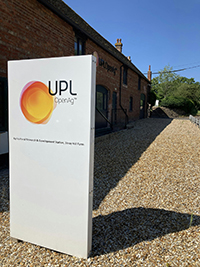This summer, UPL opened the doors of their brand-new Shray Hill research facility in Shropshire, revealing an incredible array of trials focused primarily on biological solutions.
 Illustrating UPL’s commitment to more sustainable crop protection, 70% of the research at Shray Hill includes work on bio-pesticides, bio-stimulants and plant or soil health enhancers. They market these products under their Natural Plant Protection (NPP) brand. “UPL has been on a journey to be more sustainable over the last five years,” explains Gemma Nokes, UPL’s head of marketing for the UK and Ireland. “We started by creating OpenAg research sites like this one. Next, we developed the NPP brand to promote the biosolutions we bring to the market.
Illustrating UPL’s commitment to more sustainable crop protection, 70% of the research at Shray Hill includes work on bio-pesticides, bio-stimulants and plant or soil health enhancers. They market these products under their Natural Plant Protection (NPP) brand. “UPL has been on a journey to be more sustainable over the last five years,” explains Gemma Nokes, UPL’s head of marketing for the UK and Ireland. “We started by creating OpenAg research sites like this one. Next, we developed the NPP brand to promote the biosolutions we bring to the market.
“The most successful products in our NPP portfolio are Iodus and Thiopron (sulphur), which are bio-fungicides. These are both registered fungicides, which is crucial because they have been fully approved for disease control according to a weight of evidence we have demonstrated to the authorities.
 “We do not see NPP replacing conventional chemistry. We want biological and chemical crop protection to work together in appropriate programmes. This will create a sustainable approach which maintains what we already have and develops exciting new solutions.”
“We do not see NPP replacing conventional chemistry. We want biological and chemical crop protection to work together in appropriate programmes. This will create a sustainable approach which maintains what we already have and develops exciting new solutions.”
To drive the adoption of biological solutions by farmers, UPL’s UK country manager, Vaughn Stansfield, believes that their role is to provide a body of evidence that NPP can deliver the same value as conventional crop protection.
“Agronomists and farmers are always balancing risk and reward,” says Vaughn. “They need to have confidence that the data on our NPP products has been collected to a high standard. We must develop quality products that deliver a benefit in use.
“Take Iodus, for example. We launched it two years ago as a plant health elicitor to be applied at T0 in winter wheat fungicide programmes. It is an unconventional product used within a conventional framework so that farmers can understand it more easily. We have seen the adoption rate increase over the two years, and now agronomists and farmers have witnessed the product perform in a high disease-pressure year. We expect its use to increase significantly next spring.
“NPP is central to UPL’s strategy, illustrated by our investment in R&D in this area. Our target is for double-digit growth of biosolutions every year for the foreseeable future. If the industry is going to transition to a more sustainable footing, then this kind of ambition is required to rise to the challenge,” concludes Vaughn.
